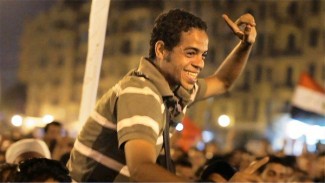The Square (Jehane Noujaim, 2013): Egypt | USA
Reviewed by Daniel Chein. Viewed on Netflix.
“We’re not looking for a leader, as much as we’re looking for a conscious” – Ahmed Hassan
I have yet to publish any reviews since the Film Festival Studies course at SBCC, but as the Santa Barbara International Film Festival has long passed, I wanted to write about films that readers can easily find and stream online. For the next few posts, I will review the Oscar runner-ups for Best Documentary Feature, all available for instant streaming via Netflix: The Square, The Act of Killing, Cutie and the Boxer, and Dirty Wars.
Have you ever watched a documentary film that seemed so unreal that you couldn’t believe it was recorded in actuality? Watching The Square, I kept thinking to myself, “how did they pull this off?” First, the subject: a 21st century revolution. Next, the setting: Egypt, located dead center amid the Arab Spring. And finally, the characters: intelligent, passionate, and charismatic individuals in one of the most controversial government overthrows in the Middle East. Given this, The Square had not only the potential to become an incredible film in its own right, but would also undoubtedly change the way viewers will remember the revolution as part of history.
Directed by Egyptian filmmaker Jehane Noujaim, The Square follows a handful of activists who take to the streets alongside tens of thousands of Egyptians to occupy Tahrir Square in protest of the country’s military dictatorship. Despite some fundamental differences in their beliefs, Ahmed Hassan, Magdy Ashour, Khalid Abdalla, and others band together in solidarity to denounce the illegitimate rule of Hosni Mubarak, calling for a democratically elected leader and new constitution. Ahmed, a true believer in the ideological progression of revolution, narrates the story and eloquently delivers the dissenting voices and tribulations of the Egyptian populace. His zealous conscience exudes passion and hope, inviting the audience to sympathize with his cause and vision. Yet his adamant fervor also reveals his weaknesses, and, as the situation unravels, the shortcomings of the revolution become apparent. Will Ahmed and the Egyptian people succeed?
I think what makes this film so powerful is the spirit of the movement that the filmmakers are able to capture. Visually, the aerial shots of Tahrir Square filled to the brink with Egyptians from all walks of life really left a strong impression on me. As the revolution picks up momentum, the stakes amplify, and the characters and filmmakers put themselves at considerable risk to produce this film, positioning themselves between live ammunition and canisters of teargas to tell this incredible story. Something that was very apparent was how close the filmmakers were to their subjects, such that they and their camera literally became a part of that story, and – like the microphone at the rallies or the cobblestone thrown by protesters – became part of the revolution itself. At the end of the film, I felt a sense of immediacy, empowered in knowing that a revolution today is not impossible, it can be realized as it was in Egypt, and, if able to unify through commonality instead of divide through disparity, will lead to meaningful social change.
About this entry
You’re currently reading “The Square (Jehane Noujaim, 2013): Egypt | USA,” an entry on Student Film Reviews
- Published:
- 03.22.14 / 9am
- Category:
- Documentary, Films, Online Films

15 Comments
Jump to comment form | comments rss [?] | trackback uri [?]